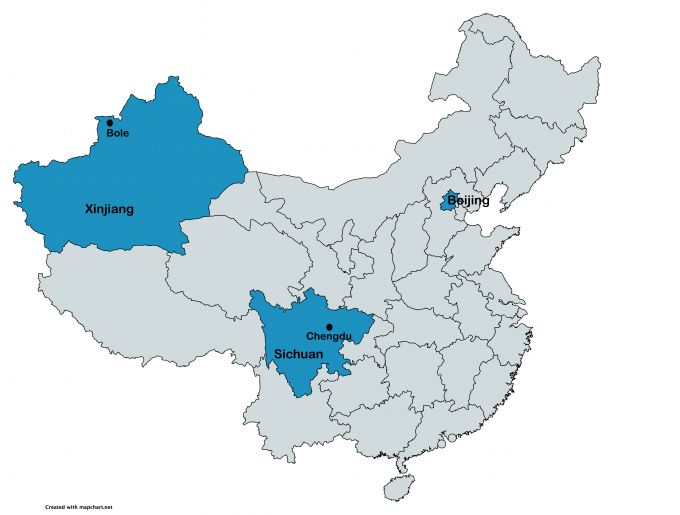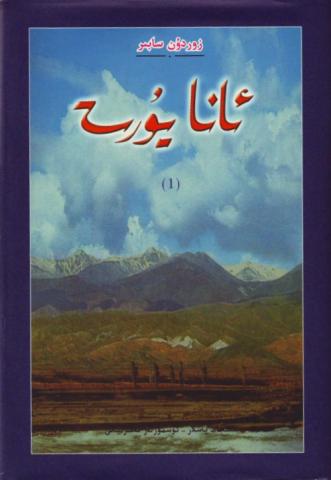New details emerge on Uyghur rapper, imprisoned for his music in China

Yashar Shohret is a Uyghur rapper and songwriter who is currently serving a three-year sentence in a Xinjiang prison on charges of promoting extremism based on his song lyrics. Radio Free Asia reported that he was sentenced in June 2024, but the news was only made public earlier this year. He was previously detained for several weeks in late 2022 for taking part in “White Paper” protests in Chengdu against the country’s strict Covid lockdowns.
WOMEN我们 magazine, recently investigated Yashar’s case and revealed new details about his sentencing and supposed crimes.

As November [2023] ushered in the depths of autumn, a lawyer embarked on a grueling journey. A 4-hour and 20-minute flight from Beijing to Urumqi, followed by a 4-hour and 5-minute high-speed train ride, finally brought him to Bole.
Bole is a county-level city perched on Xinjiang's border, at the northernmost tip of China's “rooster's tail”. It's a remote outpost: 3,282 kilometers from Beijing, 524 kilometers from the regional capital Urumqi, and sharing a 95-kilometer frontier with Kazakhstan.
He met Yashar at the city’s detention center. This was Yashar’s first contact with the outside world in over three months since he was taken from Chengdu, where he lived, on August 7. Yashar's friend, relaying the lawyer's account of the situation, painted a grim picture: Yashar was in poor condition. His sunken eyes were filled with fear.
In Chengdu's bustling teahouses, underground bars, and indie bookstores, Yashar stood out from the crowd. He was in his early twenties, with long legs, deep eyes, angular features, and a handsome Central Asian appearance. Yashar had been producing music in his native Uyghur tongue since he was a teenager. His creative process mirrored that of other rappers: he found rhymes in his personal experiences, wove through poetic narratives, and then set them to melodies. The only difference? Yashar's lyrics were in Uyghur.
On August 9, 2023, the day after the World University Games closed in Chengdu, police from Bole City in Xinjiang arrived and took him from his rented apartment. Just two weeks earlier, he had celebrated his 25th birthday.
Yashar's disappearance was silent and left no trace. There were no documents and no formal procedures. Neither his girlfriend in Chengdu nor his family in Xinjiang knew who had taken him – or where. Eventually, rumors from Xinjiang suggested he had been brought back to his hometown. It wasn't until November 13, over three months later, when the investigation into his case concluded and was forwarded to the Bole City Prosecutor's Office for review, that his lawyer finally obtained accurate information about the case. The lawyer then rushed to the border to meet with him.
WOMEN我们 magazine recently obtained the criminal verdict. It accused Yashar of "advocating extremism" and "illegally possessing items that advocate extremism", crimes listed under Article 120-3 of China’s criminal code. An informed source said that the procuratorate had originally requested a sentence of five to six years, but the court finally sentenced him to three years. He was then transferred to Wusu Prison.
Yashar's sentence runs from 11 August 2023, when he was detained, to 10 August 2026. Court documents said that Yashar created and published 51 songs on NetEase Cloud Music, 42 of which were identified as "problematic songs promoting extremism" between October 2017 and August 2023. The procuratorate also accused Yashar of using a VPN to purchase eight electronic books online from 2020 to August 2023 that were deemed to be problematic according to an official list from the region’s Propaganda Department and that either advocated terrorist ideas or religious extremism.

Those banned books included Motherland (all three volumes) by Zordun Sabir (volume I pictured above) and The Uyghurs by Turghun Almas.
Since 2015, China has implemented strict legislative controls over Xinjiang residents. The charges against Yashar stem from new offenses added to Article 120 of the Criminal Law, which came into effect on November 1, 2015, as part of the ninth amendment. These charges carry a maximum sentence of five years in prison. Shortly after this major legal revision, on December 27 of the same year, the National People's Congress passed the “Counter-Terrorism Law of the People's Republic of China”, which took effect on January 1, 2016. This legislation imposed an unprecedented criminalization of the religion, culture, and daily life of ethnic minorities in the border regions.
WOMEN我们 magazine note that even after Yashar was detained, all the songs he posted online under the stage name "uigga" remained accessible. His account was not deleted until early 2024.
Yashar has been composing rap songs in Uyghur since he was a teenager.
His stage name is “Uigga”, which he once explained in a song means “lucky star”. His lyrics often reflect the hardships which life has dealt him. For instance, when a friend committed suicide, he expressed deep regret and remorse. In 2019, participating in a rap competition in Xinjiang, he performed his original song “Maybe You, Maybe Me.” The lyrics read: “Of course, the first question is how to survive underground; life rides on your tired body, has it bent your spine too? I'm sorry there are too few people who can relax around you.”
Already, in 2017, when Yashar uploaded this song to the Internet, sharing Uyghur songs online in China was extremely difficult. He had to translate the lyrics into Chinese to prove the content was “harmless.”
July 25th is Yashar's birthday. Since 2019, he has uploaded a song around his birthday each year, depicting his state of mind. By July 25, 2023, he had released a total of five birthday songs. The lyrics within these consistently reflect themes of hustling and exhaustion in the face of life's pressures: “Even with a spine deformed from pressure, I never stop, spending every minute hustling for survival”; "Depression is like a parasite, pressure from all sides like iron chains around my throat; reality is like an ultra-sharp razor, stripping away every fiber of my self-esteem and dignity."
Yashar had also ventured into entrepreneurship with his own clothing brand and cultural company. In late November of 2022, he recorded a music video which promoted his brand’s T-shirts.
In the spring of 2023, he released a song called “Wake Up Uigga”. In the hunting scene he depicts, he's not the hunter, but the prey. “Unable to understand the fate etched on my forehead, loneliness took over–uneasiness, anxiety, worry, and fear.”
On July 23, 2023, as his birthday approached again, he released another song. Though brief, its lyrics were poignant: “How I long for a normal life, but the script I've been handed is a tragedy. I've become the story, just facing my reality.”
Just weeks later, he was detained.
This article is a rewritten adaptation based on two original pieces published by WOMEN我们 .
Written by Xiao Hong | Edited by Yi Chuan | Platform Editor: Qin Shan
Yashar Shohret: Chengdu’s ‘White Paper Youth’ Disappears for the Second Time
Written by Xiao Li | Chinese Edited by Yi Chuan | Translated by Human Rights in China
With sincere thanks to the original authors, editors and translators.